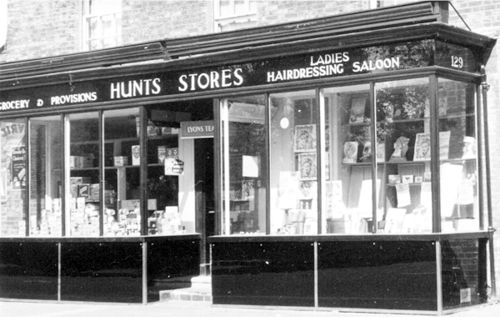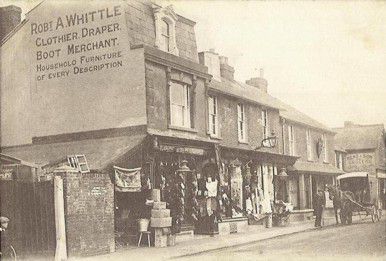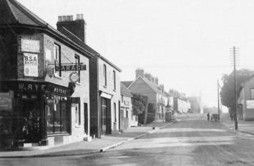A Walk Down Memory Lane,
Greenstreet 1940
A beautiful September morning and feeling refreshed after a good night’s sleep, free from enemy air raids, we assemble outside Mr Wildish’s house. This is at the west end of the village on the Teynham side of the road. Before setting off we have to check that each one of us is carrying his gas mask in its container slung over his shoulder. We were reprimanded by the Air Raid Warden for not having carried them on our previous walk. We now move off passing Mrs. Welfare’s green grocery shop taking in the pleasant aroma of fresh vegetables including celery and the like, straight from the local farms, and come to the tall building once used as a Methodist place of worship. It is now “Kisser” Kemsley’s sports hall, used by many of us as a meeting place where we play billiards, table tennis and sometimes cards. This, the only place for indoor entertainment in the village, is put “out-of-bounds” by some fathers and we are forbidden to enter.
 A few yards further on is Hunt’s Stores, a large building where groceries and provisions are available for purchase, many goods being displayed on the footpath in front of the building. Lady customers may afterwards take advantage of the Store’s hairdressing salon. Passing a large house fronted by a holly tree, the occupants of which we cannot recall, we reach a small shop which sells a variety of items for the knitting fraternity. Following and set back from the road is a long wooden building where we see Mr Arthur George busily preparing one of his many handsome coffins. Adjoining this workshop is the prominent house occupied by the George family, Mr Jim, fruit producer and sheep farmer, Mr Arthur, cabinet and coffin maker and Mr Stephen, Registrar for the area.
A few yards further on is Hunt’s Stores, a large building where groceries and provisions are available for purchase, many goods being displayed on the footpath in front of the building. Lady customers may afterwards take advantage of the Store’s hairdressing salon. Passing a large house fronted by a holly tree, the occupants of which we cannot recall, we reach a small shop which sells a variety of items for the knitting fraternity. Following and set back from the road is a long wooden building where we see Mr Arthur George busily preparing one of his many handsome coffins. Adjoining this workshop is the prominent house occupied by the George family, Mr Jim, fruit producer and sheep farmer, Mr Arthur, cabinet and coffin maker and Mr Stephen, Registrar for the area.
It is at this moment that we hear a horse approaching and see that it is Ger. Wildash in her Co-op delivery van returning from the early morning bakery deliveries. She sees us sitting on the ‘log’ sharing a bottle of ‘Bing’ between us. She offers a couple of stale buns which we gladly accept. After a short respite we move on our way feeling refreshed, cross the entrance to the Co-op fields and reach the Co-operative Stores, set back from the road (the original building, before it was burnt down, fronted the road opposite Lynsted Lane). Villagers are beginning to enter to collect their meagre rations of meat, sugar and fats etc. for the week. 
Passing a small passageway leading to the rear of the store we arrive at an imposing three storey building. This store is run by Mr R A Whittle who tells us that he sells clothes, boots and house-hold furniture of every description; many items of which are on show on the pavement at the front of the building. This is the store used by many mothers, immediately after hop-picking had finished, in which to spend their hard-earned cash on items of clothing to equip their children for return to school.
As we reach the village chemist we say a cheery “hello” to Miss Streatfield who has just arrived on her bicycle for work. She is dispenser for Mr Eacott who runs the chemist, providing all manner of medication and remedies to the villagers. The next building is a private house, set back from the road, occupied by the Read Family who run the grocers shop adjoining. Within is the village Post Office run by Mrs King. As we are about to move on an Army convoy approaches that includes two mobile searchlight units; these we later learn are destined for ‘Soldiers’ Bank’, an area to be found in Woodstreet, Dully, near Bapchild. Once the convoy has passed through we proceed on our way to arrive next at Mr Clark’s large grocery store wherein local people present their food coupons for the purchase of general supplies. Whilst here Cliff Nye arrives in his mall van having made deliveries further afield; occasionally, if we are lucky, we are allowed to accompany him on his rounds. At the end of this store there is a very small building where we meet Mr Wood arriving to start his daily job of boot and shoe repairing. Set back from the road are three brick houses occupied by Mrs Owen, Mrs Heathfield and Mrs Richards. Mrs Richards has billeted with her Land Army girls, one of whom is Miss Ena Gwynne from Manchester who is later to become Mrs Gordon Cork. The house adjoining is wooden fronted and is occupied by Mrs Smith and family.
We are now at one of our favourite haunts, Mrs Lacey’s fish and chip shop where we often visit to buy a pennyworth of golden brown crispy chips, usually after begrudgingly spending a day in the Hopfield at Sandown. It is now mid-morning and the sun is high in a cloudless sky and we feel that air activity is imminent. We are proved right when we hear the sound of approaching aircraft. In no time at all an enemy fighter is seen flying at rooftop height towards Faversham with a Hurricane on its tail. We hear the sound of machine-gun fire as they pass over. We are surprised at this activity as we have not heard the Air Raid siren sounding.
This excitement over we move to cross Teynham Lane (Station Road), but before doing so we have to wait to let Mr Streatfield pass with his horse and timber tug on his way to Cellar Hill. We now cross and see a lorry belonging to Mr Brett parked outside his garage at the top of the lane. Later it will be used to collect fruit from the many farms in the countryside for delivery to Teynham Station for onward transportation to the London Markets. Sometimes we are allowed to accompany either Stuart or his brother, Alec, on their rounds.
Crossing the passageway leading to the rear of the garage we reach the shop run by Mr Higgins, the supplier of car batteries and accessories as well as providing a battery charging service.
A short distance up Greenstreet hill is the Wray’s house fronting the large nursery that runs from Teynham Lane below the Ambulance Hut through to Frognal Lane. The main entrance to the nursery is through a gate surrounded by immaculately kept Yew hedges. This gate is immediately opposite the Victorian Pump and horse trough that sits on the pavement edge.
Once again time has caught up with us and we have to bring to an end this recollection of properties, business and private, together with certain individuals in Teynham at the beginning of World War Two.
Bernard Cork